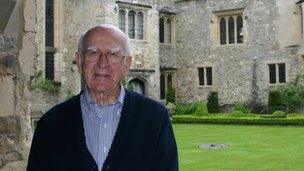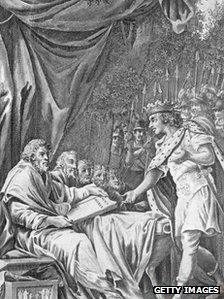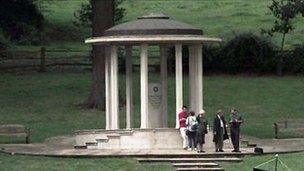Magna Carta: Passions still running high in Runnymede
- Published

Sir Robert Worcester wants to see the cornerstone of an interpretation centre laid in Runnymede in 2015
A peace treaty sealed in Runnymede in 1215, signalling the end of a conflict between King John and barons who were in revolt, has once again got passions running high in Surrey.
Events are being organised across the world to mark the 800th anniversary of the Magna Carta - in the UK, the US, Australia, France, Spain and Trinidad.
But a debate is raging on what to do in the place where the charter- hailed by some as the foundation of English democracy - was sealed.
Plans to build an £8m visitor centre in Runnymede as a legacy of the anniversary were dropped earlier this year because of lack of funds.
Surrey County Council, Runnymede Borough Council and the National Trust have all said they are now working to find a way to raise the profile of the Magna Carta and the site where it was sealed.
Was it important?
But the Magna Carta Trust's 800th committee, which is overseeing global commemorations to mark the anniversary, has said the lack of an interpretation centre at the site is a "travesty".

King John famously sealed the Magna Carta at Runnymede in Surrey
Committee chairman Sir Robert Worcester still wants a cornerstone to be placed for the building on the day of the anniversary - 15 June 2015.
He said planning permission could be achieved and the money could be raised.
His calls for more interpretation at the site have been backed by Professor Nigel Saul, a historian at Royal Holloway University, which stands next to the Magna Carta field in Runnymede.
Some historians have disputed the importance of the Magna Carta, arguing that of its 63 clauses, only three have not now been repealed or become obsolete. But Professor Saul said there could be no doubt about its significance.
He said: "The idea that Magna Carta was a narrow 'feudal' document was wrong."
He added: "There can be no doubting the historical importance of Magna Carta. It established the principle that the executive power - in this case, the king - is subject to the law just like everyone else.
"Later in the 13th Century the jurist Bracton wrote 'in England the king is below God and below the law'. The crucial clause is clause 39: No free man shall be arrested, imprisoned or dispossessed without judgement of his peers or against the law of the land.
"Magna Carta explains why we live in a constitutional monarchy today."
'Source of difficulty'

The memorial on the National Trust site is owned and was paid for by the American Bar Association
Professor Saul said leaflets, guide books, display boards and electronic devices - rather than a visitor centre - could help people visiting the site.
He said: "Currently, the Runnymede site is lacking in interpretative aids to assist the visitor who knows little or nothing about the site, or about the events of 1215.
"This is likely to be a source of some difficulty by 2015, when, as we expect, visitor numbers increase in the wake of the 800th anniversary."
Plans to build a visitor centre on Runnymede Pleasure Grounds, which is next to the National Trust-owned Magna Carta site, were put forward by Runnymede Council in 2011.
A recommendation that a visitor centre should be built had already been made in the 1990s, but two years ago the council set out to secure funds and build the centre in time for the 800th anniversary events.
Plans hit a setback when a , external, and a pledged £5m towards the £8m project was withdrawn by Surrey County Council.
'Own pilgrimage'
Runnymede Council's chief executive Paul Turrell said: "This project could never be funded, simply or wholly by public funds; we were reliant on private sponsorship which did not materialise."
The county council has since gone back to the drawing board to work out how to mark the date.
It said the focus was on improving what was at the site, in a sustainable and economically viable way, not building something new, and on developing a programme which would encourage more visitors to enjoy the natural setting close to London.
The council said it had shared its thoughts with residents who were happy with its ideas and a decision would be taken next month.
The two local authorities, the National Trust and the Magna Carta Trust's 800th committee have all agreed interpretation is needed at the site.
Anna Tomkins, from Visit Surrey, said tourism statistics for the Runnymede site were difficult to estimate because the open field had no entrance fee, gates, or turnstiles.
She said most people researched their visit and their journey to Runnymede on the internet, and because there was no big attraction such as a statue or a visitor centre, people tended to "make their own pilgrimage themselves".
Runnymede Council said car park usage showed about 150,000 people visited Runnymede Pleasure Grounds in the past financial year.
The authority said it was difficult to predict visitor numbers in 2015 but said it definitely expected a huge increase.
- Published28 September 2012
- Published28 September 2012
- Published27 September 2012
- Published27 September 2012
- Published12 November 2010